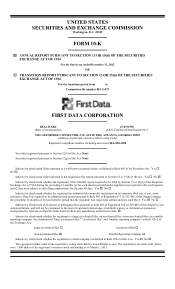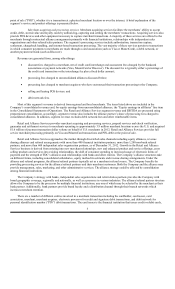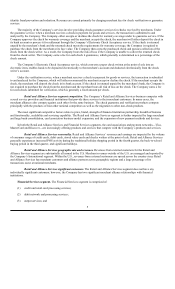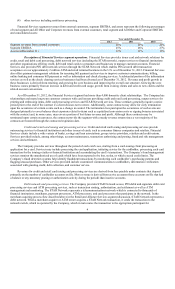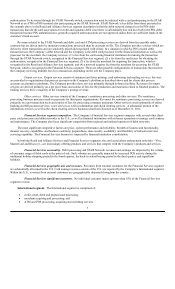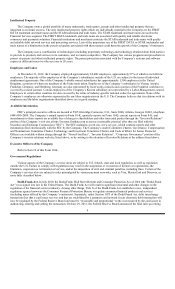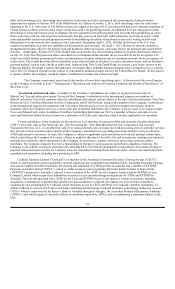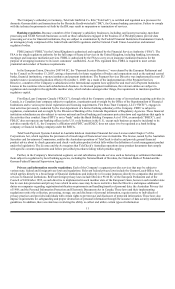First Data 2012 Annual Report Download - page 4
Download and view the complete annual report
Please find page 4 of the 2012 First Data annual report below. You can navigate through the pages in the report by either clicking on the pages listed below, or by using the keyword search tool below to find specific information within the annual report.
authorizes transactions after determining whether the cardholder has sufficient available credit or funds for the transaction, and
provides funds for the transaction. Some of these functions may be performed by an electronic processor (such as the Company’s
Financial Services business) on behalf of the issuer. The card associations, Visa or MasterCard, a debit network (such as STAR
N
etwork) or another payment network (such as Discover) route transactions between the Company and the card issuer. The merchant
is a business from which a product or service is purchased by a cardholder. The acquirer (such as the Company or one of its alliances)
contracts with merchants to facilitate their acceptance of cards. A merchant acquirer may do its own processing or, more commonly,
may outsource those functions to an electronic processor such as the Retail and Alliance Services segment. The acquirer/processor
serves as an intermediary between the merchant and the card issuer by:
(1) obtaining authorization from the card issuer through a card association or debit network;
(2) transmitting the transaction to the card issuer through the applicable card association, payment network or debit network;
and
(3) paying the merchant for the transaction. The Company typically receives the funds from the issuer via the card
association, payment network or debit network prior to paying the merchant.
A transaction occurs when a cardholder purchases something from a merchant who has contracted with the Company, an
alliance partner or a processing customer. When the merchant swipes the card through the POS terminal (which is often sold or leased,
and serviced by the Company), the Company obtains authorization for the transaction from the card issuer through the card
association, payment network or debit network, verifying that the cardholder has sufficient credit or adequate funds for the transaction.
Once the card issuer approves the transaction, the Company or the alliance acquires the transaction from the merchant and then
transmits it to the applicable debit network, payment network or card association, which then routes the transaction information to the
card issuer. Upon receipt of the transaction, the card issuer delivers funds to the Company via the card association, payment network
or debit network. Generally, the Company funds the merchant after receiving the money from the card association, payment network
or debit network. Each participant in the transaction receives compensation for processing the transaction. For example, in a
transaction using a Visa or MasterCard for $100.00 with an interchange rate of 1.5% (the cap on certain debit transactions has been
changed to $0.21), the card issuer will fund the association $98.50 and bill the cardholder $100.00 on its monthly statement. The card
association will retain assessment fees of approximately $0.10 and forward $98.40 to the Company. The Company will retain, for
example, $0.40 and pay the merchant $98.00. The $1.50 retained by the card issuer is referred to as interchange and it, like assessment
fees, is set by the card association. The $0.40 is the merchant discount and is negotiated between the merchant and the merchant
acquirer.
The Company and its alliances, as merchant acquirers/processors, have certain contingent liabilities for the transactions acquired
from merchants. This contingent liability arises in the event of a billing dispute between the merchant and a cardholder that is
ultimately resolved in the cardholder’s favor. In such a case, the transaction is “charged back” to the merchant and the disputed
amount is credited or otherwise refunded to the cardholder. The Company may, however, collect this amount from the card association
if the amount was disputed in error. If the Company or the alliance is unable to collect this amount from the merchant, due to the
merchant’s insolvency or other reasons, the Company or the alliance will bear the loss for the amount of the refund paid to the
cardholder. In most cases, this contingent liability situation is unlikely to arise because most products or services are delivered when
purchased, and credits are issued on returned items. However, where the product or service is not provided until sometime following
the purchase (e.g., airline or cruise ship tickets), the risk is greater. The Company often mitigates its risk by obtaining collateral from
merchants considered higher risk because they have a time delay in the delivery of services, operate in industries that experience
chargebacks or are less creditworthy.
Prepaid services. First Data Prepaid Services manages prepaid stored-value card issuance and processing services (i.e. gift
cards) for retailers and others. The full-service stored-value/gift card program offers transaction processing services, card issuance and
customer service for over 200 national brands and several thousand small and mid-tier merchants. The Company also provides
program management and processing services for association-branded, bank-issued, open loop, stored-value, reloadable and one time
prepaid card products.
Money Network offers prepaid products to address the needs of employers, employees, merchants and unbanked
individuals. Money Network provides open loop electronic payroll distribution solutions that reduce or eliminate an employer’s
expense associated with traditional paper paychecks as well as other prepaid retail solutions.
Check verification, settlement and guarantee services. TeleCheck offers check verification, settlement and guarantee
services using the Company’s proprietary database system to assist merchants in deciding whether accepting checks at the point of
sale is a reasonable risk, or, further, to guarantee checks presented to merchants if they are approved. These services include risk
management services, which utilize software, information and analysis to assist the merchant in the decision process and include
4

